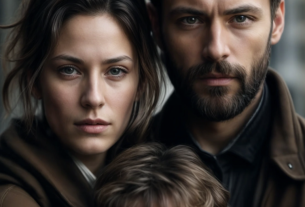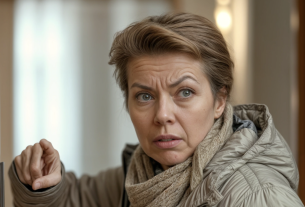Valya found out by accident that her husband had another woman — she went to the dry cleaner’s to pick up his suit, and along with the suit they gave her a huge floral dress. She said it was a mistake, but the girl with strict glasses pointed with her manicured finger to the logbook. Everything was correct: one blue wool suit, one silk floral dress.
In the movies, mistresses are always young and slim. Valya’s rival turned out to be the same age as her and wore clothes two sizes larger than Valya herself, who after fifty had started to gain some weight, but not critically—at least the shop assistants hadn’t suggested she shop in the plus-size section. But that woman definitely could have used it.
“Sasha, what is this?” she calmly asked her husband that evening, biting the inside of her cheek so as not to scream.
For some reason, she thought her husband would deny everything, tell some story about a distant cousin or something like that. But he sank heavily into his armchair, covered his face with his hands, and said in a muffled voice:
“I love her.”
It turned out he had been living in two homes for a year. And it also turned out that Valya knew her rival very well — it was Lena, the hairdresser Valya had once visited when her own hairdresser was on vacation. She hadn’t liked the haircut — it was too short — and never went back. How they ended up together with Sasha was a mystery; Valya didn’t ask, afraid she wouldn’t hold back and would scream. But screaming was not her style; Valya always prided herself on being balanced.
They divorced quietly, without quarrels or drama. Sasha, happy with the arrangement, left her the apartment, but took the dacha and the car — his Lena was an avid gardener and was already planning what kinds of tomatoes and radishes she would grow there. Valya never liked the dacha, so she wasn’t too upset. She didn’t drive, so she didn’t miss the car either. But life without her husband, whom she thought she never really loved, was hard. Maybe she had just gotten used to him, or maybe she was too old to be alone. Her daughter wanted to fly in from Vladivostok, but Valya talked her out of it—they had never been very close anyway, and the daughter would just lecture her, as usual.
“Mom, you have to work. How long can you sit at home?”
“Mom, look, there’s a program for the elderly. You could study and then get a job!”
“Mom, what’s that coat you’re wearing? Did you steal it from the museum cloakroom?”
No, Valya didn’t need that right now. But she had to admit — her daughter was right, and she had to work. But Sasha didn’t want Valya to work; he liked having hot meals waiting at home and sterile cleanliness — his mother was a doctor and had raised him with a sense of cleanliness from childhood. Valya was busy with her daughter too — ballet, English, tutors… What for, no one understood — now the daughter worked as a dancer, dancing half-naked on stage. If Valya had known, she wouldn’t have wasted so much effort and money.
When Valya went to her first job interview, she was sure she would get the job. By the fifteenth, she knew she would be rejected. A kind woman in the queue recommended she contact the employment service. By that time, Valya’s money was almost gone, and she was ashamed to ask her daughter.
At the employment office, an unfriendly young woman greeted her, who also apparently had to shop in the plus-size section. She glanced at Valya’s documents absentmindedly and asked:
“So, you haven’t worked anywhere since you were twenty-three?”
“Is that illegal? The article for parasitism was abolished long ago!” Valya snapped.
The girl snorted.
“And your education is in architecture… You do know that field has… changed quite a bit in thirty years?”
“Are you implying I’m out of touch? By the way, I mastered the smartphone faster than my daughter — she still can’t properly edit photos!”
The girl looked at her more closely.
“Do you have a daughter?”
“Of course!”
“And how old is she?”
“She’s almost thirty. But what does that have to do with anything? I need a job, not her. Although… if you only knew what she does for work, it’s shameful… I’ve spent my whole life on her, not working for thirty years, and she…”
The girl slammed the folder shut and said:
“Alright. My name is Marina. I’m hiring you. I need someone to help me communicate with my mother.”
Valya stared at her in surprise.
“What do I have to do with that?”
“You look exactly like my mother! My psychologist told me I won’t solve my problems until I learn to communicate properly with my mother. How can I do that? Whatever I say, she’s always unhappy! So I’m thinking — maybe you could answer for me? With the right words. She’ll stop scolding me, and I’ll stop eating nonstop. How about that?”
The offer was so absurd that Valya laughed. She stood up, took her documents, and said:
“I think I’m starting to understand your mother. I’ve never heard such nonsense in my life!”
Valya was already heading for the door but turned back for some reason. The girl’s face scrunched up and she sniffled childishly. The daughter used to cry like that as a child too. Valya stopped.
“Alright,” she said. “But you have to promise I’ll tell everyone I got a job as a psychologist. I’ll say I took retraining courses.”
At first, things didn’t go well: Marina called her, read her mother’s messages, asked what to answer. Valya dictated, Marina started arguing. But tired of arguing, Marina sometimes gave in and answered with something in the middle — and the result was quick: her mother scolded less, and Marina ate less.
On Saturdays, Marina had calls with her mother, and on those days Valya came to her apartment. Marina put the call on speakerphone, and Valya wrote answers on a piece of paper. Marina’s relationship with her mother really improved, although even Valya admitted that Marina’s mother went too far. Yes, the girl was overweight, but was that a reason to scold her? The poor girl ran to the bathroom after every meal, was that normal?
“Where’s your father?” Valya asked, thinking maybe he also had a mistress, which was why Marina’s mother was so angry.
“He died many years ago, I was little,” Marina replied. “I was so angry at him as a child! That he abandoned us. I didn’t understand then that death can’t be stopped. We lived poorly, had no money, nothing to eat. Sometimes I think that’s why I eat so much — I grabbed food and can’t stop.”
The girl was pitiful. And although Valya had found a decent job — a controller at a movie theater — she still helped her. After the Saturday calls, they drank tea and talked. At first about nothing, then Marina started sharing her love life, and Valya told about her husband and his mistress, and about her daughter working as a dancer.
“Can I tell this to my mother?” Marina laughed. “She doesn’t like my job.”
Surprisingly, Valya even told Marina about her sister.
“We were always close, never fought in our lives! Then I fell in love. His name was Yakov — tall, handsome, a mechanic at the depot. But I was proud and told him he wasn’t good enough for me. Nastya, of course, knew I liked him. And said I was a fool. And she was right — I was a professor’s daughter, educated, well-mannered. And who was he? I was stupid. I went to grandma’s for the summer, and when I came back, those two were already dating. I told my sister she would ruin her life and left forever.”
“What do you mean ‘forever’?” Marina didn’t understand.
“Literally forever. We saw each other only three times — at dad’s funeral, mom’s funeral, and at the notary when they arranged the will. He took her to Kaluga, and she married Sasha here.”
“And you still don’t talk?”
Valya swallowed a lump that made it hard to breathe and said:
“She died two years ago.”
“And you didn’t even go to the funeral?”
“No,” Valya confirmed.
Marina shook her head.
“Yeah… looks like you need a psychologist more than I do. You know what? You should go to her grave. To your sister. And talk to her like she’s alive. I did that with my dad. It helped.”
At first, Valya didn’t take the advice seriously. But the thought lingered. She remembered how Yakov called, how her lips went numb and couldn’t say a word — whether from horror at the impossibility of believing her sister was gone, or because his voice still had power over her, making her heart skip. She didn’t tell Sasha and didn’t go to the funeral. She didn’t want to see her sister dead, couldn’t face Yakov and give herself away.
She knew the address — her sister had sent letters all those years, including photos of herself and the children. Valya cut Yakov out of the shared photos and hid them in a separate folder. Luckily, neither her daughter nor Sasha found that folder. What if she had died suddenly like that? What if someone found those broken photos while sorting through her things?
Tossing and turning until three a.m., Valya got up and bought a ticket to Kaluga. Quickly, before she changed her mind. After that, she slept so deeply that she missed the alarm for the first time in many years.
Marina approved her decision and said she could probably manage without Valya’s help now.
“Maybe I’ll even visit my mom,” Marina said uncertainly.
On the train, Valya met a lovely young couple going on their honeymoon. It seemed a strange choice to travel by train for a honeymoon, but everyone has their quirks. They told her which hotel to stay at in Kaluga and where to find the grave — the girl was from there, lived there until she was fifteen.
Valya didn’t like the hotel much — the rooms were small and stuffy, the windows faced the road. But it was only for a short stay. After putting down her suitcase and washing up, Valya called the cemetery administration. Saying her sister’s name was strange, bitter in her mouth, and her eyes felt like they were burned by hot air. She rehearsed what to say to Nastya — that she forgave her, no longer held a grudge, regretted the years she ignored her letters even though she read and reread them, stacking them in piles. The words came out poorly, unwilling to leave her mouth. Valya sighed, changed into a strict dress (after all, she was going to a cemetery), noted it hung loosely on her (from nerves or maybe because, unlike Marina, she had lost weight), and was even satisfied with her reflection.
She decided to buy flowers near the cemetery, sure they would be sold there. She left the room with only her purse, walked down the hall and stairs, and bumped into a man in a plaid suit — he held the heavy door for her.
“Valya?”
His voice made her heart skip a beat. If not for the photos her sister had sent over the years, she wouldn’t have recognized him — Yakov had changed a lot since their last meeting. And so had she. But he recognized her, though Valya hadn’t sent any photos.
She stopped, unsure what to do next. He stepped forward and hugged her tightly. He smelled of lemon and sea water.
“How are you here, Valya? Why didn’t you call?”
She stood like a statue — didn’t raise her arms to hug back, couldn’t even force a smile. Valya thought her feelings had dried up and faded over the years, but now they rose inside her, winding like vines, blooming strange flowers that smelled of lemon and sea water.
“I wanted to visit Nastya’s grave,” she said with difficulty, realizing silence would be too strange. “I didn’t want to bother anyone, so I decided to stay in a hotel.”
Yakov laughed.
“That’s my hotel! What a coincidence — I didn’t want to come today either, but the basement pipe burst, so I decided to check things myself. Valya, I’m so glad to see you! You haven’t changed at all… You know what? Let me ask the girls to make you coffee, with cream, just like you like it. You still like cream, right? I’ll take care of my business quickly, take you to the cemetery. And then to our place. No objections! The kids are coming tonight — you haven’t seen them yet, have you? I’ll have your things moved to us. Actually, I was going to call you myself but was afraid you wouldn’t answer, and…”
He spread his hands and fell silent. Valya suddenly realized all her fears and resentments over the years were only in her head. She felt a sharp longing for time that could never be returned, for the sister she had barely known because of her own foolishness. And she said:
“Alright. Let’s do it your way.”
At the cemetery, Yakov stepped aside delicately. Valya couldn’t say anything to her sister but looked at a photo of her grown-up with kind eyes like their mother’s. She promised to come back.
The house was cozy, a bit cluttered, but still nice. It felt like it lacked a woman’s touch — it could use a good cleaning.
“Don’t any of your children want to live with you?” she asked Yakov, trying to sound casual.
“No,” he sighed. “My daughter-in-law doesn’t like private houses, and my daughters have a long commute to work. But they visit me in turn. Thank you for caring, that’s so nice. I know you hated me all these years, thought I wasn’t good enough for your sister. But I swear, I was a good husband and never hurt her. Honestly, when I was young, I dreamed of marrying you. Yes, yes, don’t look like that! You were such a beauty! And you still are.”
Valya stood confused. What was he talking about?
“Are you feeling unwell?” Yakov got worried. “Sit here, I’ll bring you some water.”
He fussed and ran to the kitchen. Valya sank into the armchair and closed her eyes. So, things weren’t as bad as she thought. She had been afraid her sister and Yakov knew about her unrequited love, pitied her, or maybe laughed. But it turned out they thought Valya simply didn’t love him enough.
Something touched her foot. She opened her eyes scared. A scruffy dog curled up there, quietly growling and trying to lay its head on her shoe.
“Vega?” Yakov was surprised.
He stood at the door with a glass of water, mouth open.
“Is that your dog?”
The question was silly — Valya understood that. Of course it was theirs, not some stranger’s dog!
“After Nastya died, she lets no one near — neither me nor the kids. She even bit me recently.”
He showed his hand, but there was no bite mark. Still, Valya understood the meaning. She bent down and carefully petted the dog.
At that moment, the phone rang. She frowned — how untimely! She wanted to hang up but saw it was Marina. Poor girl, probably had another fight with her mother.
“Hello?”
“Valentina Vasilievna? This is Marina. How are you? Sorry to call, but I think there’s progress! After our talk, I decided — since you found the strength after all these years to go, why can’t I just visit my mom? Sooner or later, she’ll make me anyway. I bought a cake and went. I ate only one piece! She kept saying I was fat and no one would want me. When I showed her a photo of Mark, she said you can tell by his eyes he’s no good. But I stood my ground and didn’t argue or cry. But then, at night, I broke down. Went to the kitchen, got the cake, sat on the floor, and started eating with a spoon, right from the box. I ate and cried. She came in, saw me, took the spoon, and sat next to me. So we sat silently — eating cake and wiping tears. Then she suddenly said: ‘I was so scared you’d be a boy. He used to beat me, your father. Never left marks; I couldn’t complain to anyone. And I was scared the son would be like him. But you were born. And I got even more scared — I realized you’d grow up just like me. You’d get beaten too, and have to give birth. I wanted you to have a different life. You understand?’ And I told her when my ex called me fat, I slapped him and kicked him out. We laughed, can you imagine? Then she said: ‘You’re not fat, you’re beautiful, my daughter.’ Then I cried, and she cried. We were covered in cake and tears but so happy. I threw the cake away and never wanted to eat it again. And I never wanted to argue with her again. Sorry, I keep talking — how are you?”
Valya looked at the photo of her sister in the frame, at the dog curled at her feet. She didn’t look at Yakov but felt his presence behind her.
“I’m fine,” she said. “I think now everything will be okay.”



